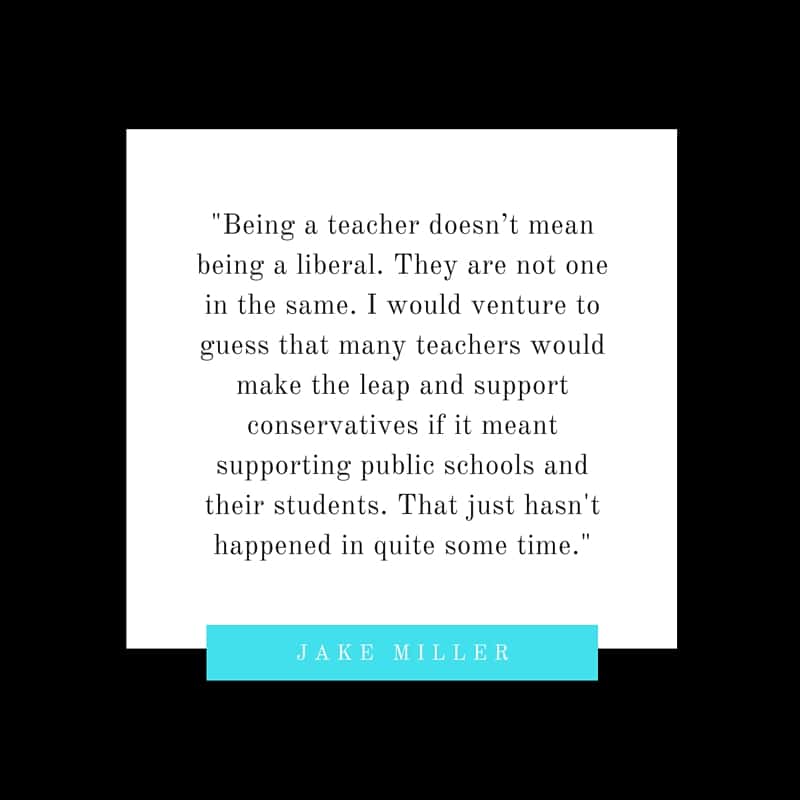This column is written as a complement to the column “Why Some Teachers are Conservative,” by fellow TER writer Jeremy Adams.
When the Harrisburg Patriot-News and Washington Post declared teaching the “most liberal job in America,” one would be hard-pressed to find a reader overcome with shock and surprise. In fact, maybe this has become a given (and overarching stereotype) in the political sphere today — educators are simply liberal. There are reasons for that.
PERSONAL BACKGROUND
However, this piece is not a confession. As a moderate citizen voter, I’ve belonged to, worked for, and volunteered for campaigns of several political parties, ideologies, and beliefs.
As a social studies teacher, I keep my own personal politics close to the chest. I don’t abuse the fact that I’m in a position of power and have a captive audience. Indeed, I agree with A. Bronson Alcott who states, “The true teacher defends his pupils against his own personal influence.”
Still, students will often ask which political party I subscribe, my views on certain hot button issues, and, most recently, which presidential candidate I’ll be voting for in the upcoming Pennsylvania primary election. (I demure and deflect all their questions.) I find the queries to be overly simplistic, as whether one turns towards Trump or is headed for Hillary has little to no bearing on pedagogy or student success.
WHAT IT’S LIKE TO BE A CONSERVATIVE
You’ll also read Jeremy Adams’s article on being a conservative teacher. Just like his tome, this message is not an instructional and institutional piece on brainwashing students or politically endorsing the Democratic Party, socialism, or communism. It is neither a bash on nor an exclusion of our conservative teachers, like Adams or our conservative students. Even though Rush Limbaugh and others think otherwise, many, most, or maybe all teachers believe students (and their own beliefs) are too important for such triviality and shameless promotion of their own political creed.
WHY EDUCATORS ARE LIBERAL
Educators are voters who vote often. And they often vote liberal. Here’s why:
1. They are after “the pursuit of happiness” — not money
This same story that declared teachers the “most liberal” also declared those in the oil industry “the most conservative.” Workers who enter the oil industry do so because it’s a very lucrative field. However, it’s very much in conflict with environmentalism, also a tenet of liberals. So, you’ll hardly find a liberal on an oil rig or in the backrooms of an ExxonMobil stock deal. Most of my self-professed conservative friends are in their careers because they have an excellent chance to improve themselves financially. Similarly, teachers aren’t in this profession for the money. While teachers in many states live comfortably, they are not generating income hand-over-fist. Prospective employees who value community impact over financial impact, therefore, are more drawn to education.
2. Toleration
It’s difficult to remain socially conservative after being in the classroom for many years. While I was student-teaching 10 years ago, a 7th-grade student approached me and told me he thought he was gay. Each year since, students have been finding and expressing themselves to the greater public that is our classrooms. Just this year, I had my first student announce she was transsexual. I’ve had students admit that they were raped by their parents and, thus, had an abortion. I’ve seen students who need medication to survive or a new set of clothes with hardly a soul to provide them. Other students dress awkwardly and stretch the boundaries on freedom of speech. Most recently, I’ve also seen students (and even parents) approach Muslim students and hammer them with incendiary, derogatory insults. And teachers’ “bleeding hearts” are bled dry for each and every one of these students.
3. School-to-prison pipeline
Benjamin Franklin quipped that “an ounce of prevention is worth a pound of cure.” Many teachers struggle to understand how we live in a world where incarceration rates have increased 700% since 1970; meanwhile, there’s hardly an eye batted to the increasing prison population and the ever increasing expense it costs to maintain and staff them, let alone building new prisons. They also impatiently watch drugs impact students and their communities, while the current “solution” by adding these offenders to the prison population instead of providing them treatment. Many teachers feel that, if they had more time with these perpetrators and criminals as students, they could help upend the perpetuity of the school-to-prison pipeline (and all the nasty statistics) as an ounce of prevention.
4. Unionism
Overall, teachers are more represented by unions than any other profession. The largest union in America (the National Education Association), though dipping in numbers, still claims 3 million members. Their activism from 100 years ago helped take a profession that would fire females for being pregnant to creating one that makes for a livable wage. Though teachers are being pinched by post-recession struggles of municipalities, most educators in strong union states earn enough to care for their family and provide a pension for retirement. They’ve also used their union to combat against recent attacks on education, namely the proliferation of standardized testing at the expense of sorely needed minutes in the classroom. While unions – at their historical core, at least – are not liberal per se, they have seemed to only find current fanfare in that political sphere.
5. Sustaining democracy
John Adams, while serving in Massachusetts as a legislator, once declared public schools the promoters of the American way of life, and that “the whole people must take upon themselves the education of the whole people and be willing to bear the expenses of it.” The American education model has provided an ideal for other nations to replicate and begin a democratic-republic in their own countries. However, for some, it’s been an expensive thing to sustain. They see public education more like their cable bill than they do an investment in the community and human capital. Teachers, on the other hand, see themselves as future-brokers for the next generation of Americans; they take up the challenge to help the child to become a thinker, a voting citizen, a responsible consumer, and an employable adult. They believe they are sustaining Adams’s democratic vision.
6. The dismantling of public education
Finally, and probably most prolifically/ what makes teachers liberal is the dismantling of public education. In the 21st century, conservative states like Kansas are changing the rules of the school; the effects could not be more drastic. In urban areas, conservatives (and some pressured, frustrated liberals) are ready to hand the keys to the school house over to private firms. Additionally, many of these elected officials expect more and want to pay less, as they attack teachers’ rights to collectively bargain a contract, their pensions, and associate with a union while also burdening students with increasing amount of test scores, red tape, and cutting back on investments in materials, technology, and teachers.
CONCLUSION
To close, being a teacher doesn’t mean being a liberal. They are not one in the same. I would venture to guess that many teachers would make the leap and support conservatives if it meant supporting public schools and their students. That just hasn’t happened in quite some time.
In the end, this article is solely a reasoned explanation that is probably not (and has no intentions to be) all-inclusive.
It is not an excuse. Neither is it an apology. Most of all, it is not a knock on or a slinging of sand in the face to conservative teachers – many of whom are close friends of mine, including the sagely Jeremy Adams.
We’re teachers here who, despite our differences, get along because we have America’s future at stake. And, politicians, take note: you have much to learn from this.








Leave a comment